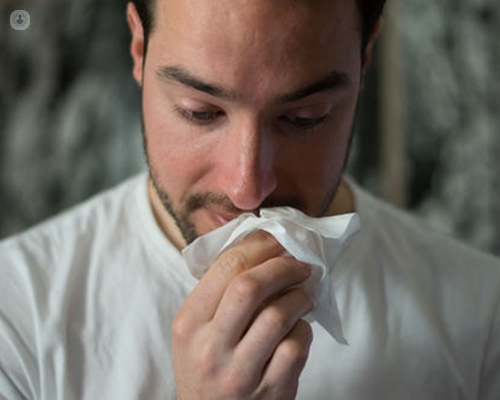

What is dust mite allergy?
Dust mite allergy is an allergic reaction to the tiny insects that are found at home. The bugs are relatives of ticks and spiders and are so tiny, measuring between 0.2 and 0.3 millimetres, that they cannot be seen by the naked eye. Dust mites thrive in warm, humid environments. They are most commonly found in bedding, upholstered furniture and carpeting. Signs of a reaction to dust mites are similar to hay fever.

What are the symptoms of dust mite allergy?
Allergic reactions to dust mites are usually respiratory. The main symptoms of allergy to mites include:
- sneezing
- nasal congestion
- a runny nose
- inflammation and itching of the eyes
- itchy throat and cough
- Skin rashes, such as eczema or hives
- asthma
Those affected by allergies to dust mites may suffer one or several symptoms and it can be at any given time as it is not a seasonal allergy.
What are the triggers of dust mite allergy?
Triggers of dust allergy include:
- dust mites
- cockroaches
- mould
- pollen
- pet hair, fur, feathers
Can dust mite allergy be prevented?
The only thing that can be done to prevent the symptoms of a dust mite allergy is to limit the amount of these insects in the home. This can be achieved by:
- choosing wooden floors over carpet
- fit roller blinds instead of curtains
- use leather or plastic furniture over upholstered
- clean cushions, curtains and bedding regularly by washing at a high-temperature
- use allergy-proof covers on bedding
- vacuum regularly
- wipe surfaces with a damp clean cloth
What is the treatment of dust mite allergy?
There is no present cure for dust mite allergy but they are controllable. Medicines for allergies include antihistamine tablets, nasal and eye drops and asthma inhalers. However, if the symptoms are severe then it is recommended to see a specialist (allergist) to discuss a treatment plan. Immunotherapy (an allergy shot) is used to develop the tolerance of an allergen and may help to significantly reduce symptoms in some people. The treatment involves regular injections or oral tablets over the course of a few years.
